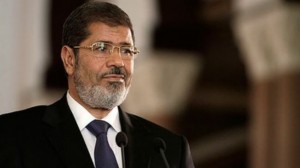 The US has called on Egypt's army to free deposed President Mohamed Morsi, amid ongoing protests on the first Friday of Ramadan.
The US has called on Egypt's army to free deposed President Mohamed Morsi, amid ongoing protests on the first Friday of Ramadan.The appeal echoed a similar call hours earlier from Germany.
The Islamist Mr Morsi, who was ousted last week after the army stepped in, has since been held at a "safe" but unspecified location.
Dozens of people have since died in clashes during major demonstrations by pro- and anti-Morsi protesters.
Mr Morsi's supporters gathered in their tens of thousands in the east of the capital, Cairo, on Friday - the first Friday of the fasting month of Ramadan - demanding his reinstatement.
Protesters against Mr Morsi, whose mass demonstrations led to his removal by the army last week, gathered in smaller numbers in Tahrir Square.
Mr Morsi's Muslim Brotherhood movement may have alienated many people while in office, but many Egyptians are also uneasy at the military's intervention in the country's politics, analysts say, and what is emerging is a battle for public opinion and the middle ground.
Washington warnings
Washington had so far avoided calling in public for the release of Mohammed Morsi, only urging the Egyptian army to stop arbitrary arrests without specifically referring to the deposed president, says the BBC's Kim Ghattas in Washington.
But after Germany said Mr Morsi should be freed from house arrest, the US was put on the spot, adds our correspondent.
Earlier on Friday, Germany's foreign ministry had urged the Egyptian authorities to end restrictions on Mr Morsi and allow an international organisation, such as the Red Cross, access to him.
Asked if the US agreed that he should be released, state department spokeswoman Jen Psaki told reporters: "We do agree."
On Thursday, Washington had urged Egypt's leadership to stop the "arbitrary" arrests of Muslim Brotherhood members, warning against targeting any particular group.
However, White House spokesman Jay Carney said that the US administration did not believe it should immediately suspend aid to Egypt.
Washington is due to send four F-16 fighter jets to Egypt, but has not publicly confirmed that the delivery will go ahead.
The US says it is examining whether the military takeover constitutes a coup - US law prohibits the sending of aid to any country whose elected leader is deposed by a military coup.
UN chief Ban Ki-moon has warned against the exclusion of any party from the political process.
Polarised nation
Mr Morsi's supporters have been staging mass protests throughout the week near the Presidential Guard barracks in eastern Cairo, where they believe he is being held.
The focal point of the protest is the nearby Rabaa al-Adawiya Mosque, where they are camping out around the clock in their thousands.
Tens of thousands came for midday prayers outside the mosque despite the heat and the absence of food and drink, in what was billed as a full day of protests.
Mr Morsi's supporters said they were not seeking confrontation or violence, but given the bitterly polarised situation, with feelings running high on both sides, the potential is always there, correspondents say.
Anti-Morsi factions were planning a mass iftar - breaking the fast - rally on Tahrir Square.
Mr Morsi was removed on 3 July - a year after he was elected - following nationwide protests by millions of people; an interim president, Adly Mansour, was installed.
Prosecutors are reportedly planning to investigate allegations that Mr Morsi and other Muslim Brotherhood leaders escaped from jail in 2011 with the help of the Palestinian Islamist group Hamas.
The Brotherhood leaders had been arrested two days earlier, in the midst of the revolution that overthrew Hosni Mubarak, and sent to the Wadi Natroun prison, north of Cairo.
Hamas has been accused of sending fighters from Gaza to storm prisons, thereby violating Egyptian security. It denies the accusations.
On Monday alone more than 50 Morsi loyalists were killed in clashes with the army.
The Muslim Brotherhood's spiritual leader, Mohammed Badie, and nine other senior figures were charged on Wednesday with inciting Monday's violence, despite conflicting accounts of the incident.
Mr Badie's whereabouts are not known.
Mr Mansour has set a timetable for a new constitution and elections, but Mr Morsi's supporters have rejected the plan and some political groups opposed to him say they were not consulted about it.
Meanwhile Hazem al-Beblawi, appointed as prime minister on Tuesday by Mr Mansour, has said he could offer cabinet posts to the Freedom and Justice Party (FJP), the political wing of the Muslim Brotherhood.
The FJP has rejected the offer.
By BBC News
The Iran Project is not responsible for the content of quoted articles.










